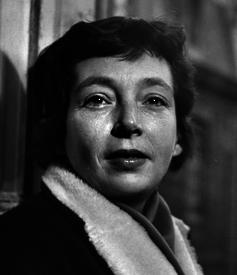
A King Lear-like role for a mature woman exists. In DAYS IN THE TREES, by Marguerite Duras. A character referred to only as Mother is so domineering she authors a tragic role for herself that Shakespeare may have envied. Unlike Brecht’s play Mother Courage and Her Children, DAYS IN THE TREES is seldom produced. This is woeful, an indictment of our stodgy regard for staging drama. Now that life has slowed down for many of us theatre folk on lockdown—consider this neglected play.
THE KEY FIGURE IN THE LIFE AND WORK OF DURAS
Marguerite Duras (1914-96) was born weeks before the outbreak of World War I. Her birthplace is Gia-Dinh near Saigon in what is now Southern Vietnam–then part of the French Colony Cochinchina. After her father died of amoebic dysentery, Marguerite was brought up with her two brothers by her mother. Her mother Marie Legrand decided to stay on in Indochina. She made a humble living as a teacher and by playing the piano for silent films. Later acquiring land on the Cambodian coast. The land turned out to be worthless. She went bankrupt trying in vain to build dams to protect her rice paddies against the yearly advance of the sea. Owing to this, the mother is the key figure in the life and work of Marguerite Duras.
As Jean-Louis Arnaud has written, “The mother figure in The Sea Wall (1950) can be found thirty years later in The Lover, always the same, plain-spoken, courageous and obstinate to the point of absurdity in her choices and her prejudices; loved and hated, respected and denigrated all at once.”

Recent Comments